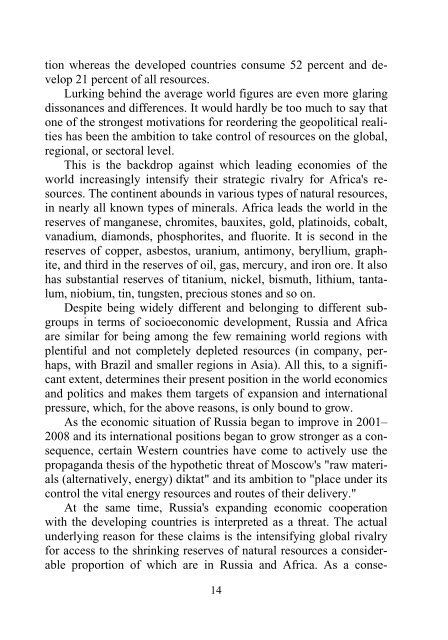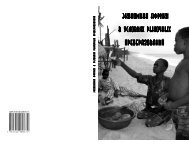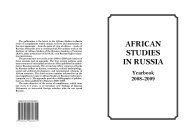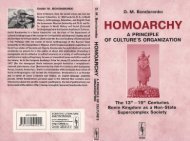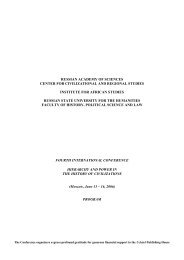L. Fituni, I. Abramova Resource Potential of Africa and Russia's ...
L. Fituni, I. Abramova Resource Potential of Africa and Russia's ...
L. Fituni, I. Abramova Resource Potential of Africa and Russia's ...
You also want an ePaper? Increase the reach of your titles
YUMPU automatically turns print PDFs into web optimized ePapers that Google loves.
tion whereas the developed countries consume 52 percent <strong>and</strong> develop<br />
21 percent <strong>of</strong> all resources.<br />
Lurking behind the average world figures are even more glaring<br />
dissonances <strong>and</strong> differences. It would hardly be too much to say that<br />
one <strong>of</strong> the strongest motivations for reordering the geopolitical realities<br />
has been the ambition to take control <strong>of</strong> resources on the global,<br />
regional, or sectoral level.<br />
This is the backdrop against which leading economies <strong>of</strong> the<br />
world increasingly intensify their strategic rivalry for <strong>Africa</strong>'s resources.<br />
The continent abounds in various types <strong>of</strong> natural resources,<br />
in nearly all known types <strong>of</strong> minerals. <strong>Africa</strong> leads the world in the<br />
reserves <strong>of</strong> manganese, chromites, bauxites, gold, platinoids, cobalt,<br />
vanadium, diamonds, phosphorites, <strong>and</strong> fluorite. It is second in the<br />
reserves <strong>of</strong> copper, asbestos, uranium, antimony, beryllium, graphite,<br />
<strong>and</strong> third in the reserves <strong>of</strong> oil, gas, mercury, <strong>and</strong> iron ore. It also<br />
has substantial reserves <strong>of</strong> titanium, nickel, bismuth, lithium, tantalum,<br />
niobium, tin, tungsten, precious stones <strong>and</strong> so on.<br />
Despite being widely different <strong>and</strong> belonging to different subgroups<br />
in terms <strong>of</strong> socioeconomic development, Russia <strong>and</strong> <strong>Africa</strong><br />
are similar for being among the few remaining world regions with<br />
plentiful <strong>and</strong> not completely depleted resources (in company, perhaps,<br />
with Brazil <strong>and</strong> smaller regions in Asia). All this, to a significant<br />
extent, determines their present position in the world economics<br />
<strong>and</strong> politics <strong>and</strong> makes them targets <strong>of</strong> expansion <strong>and</strong> international<br />
pressure, which, for the above reasons, is only bound to grow.<br />
As the economic situation <strong>of</strong> Russia began to improve in 2001–<br />
2008 <strong>and</strong> its international positions began to grow stronger as a consequence,<br />
certain Western countries have come to actively use the<br />
propag<strong>and</strong>a thesis <strong>of</strong> the hypothetic threat <strong>of</strong> Moscow's "raw materials<br />
(alternatively, energy) diktat" <strong>and</strong> its ambition to "place under its<br />
control the vital energy resources <strong>and</strong> routes <strong>of</strong> their delivery."<br />
At the same time, <strong>Russia's</strong> exp<strong>and</strong>ing economic cooperation<br />
with the developing countries is interpreted as a threat. The actual<br />
underlying reason for these claims is the intensifying global rivalry<br />
for access to the shrinking reserves <strong>of</strong> natural resources a considerable<br />
proportion <strong>of</strong> which are in Russia <strong>and</strong> <strong>Africa</strong>. As a conse-<br />
14


